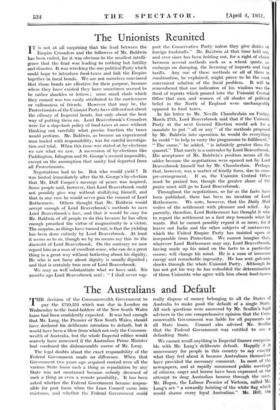The Unionists Reunited
IT is not at all surprising that the feud between the Empire Crusaders and the followers of Mr. Baldwin has been ended, for it was obvious to the smallest intelli- gence that the feud was leading to nothing but futility and disaster. It was wrecking the one political Party which could hope to introduce food-taxes and link the Empire together in fiscal bonds. We are not ourselves convinced that those bonds are effective for their purpose, because where they have existed they have sometimes seemed to be rather shackles or fetters ; some small chafe which they caused was too easily attributed to the carelessness or callousness of friends. However that may be, the Protectionists of the Unionist Party have differed not about the efficacy of Imperial bonds, but only about the best way of putting them on. Lord Beaverbrook's Crusaders were for a slap-dash policy of food-taxes at once without thinking out carefully what precise function the taxes would perform. Mr. Baldwin, as became an experienced man loaded with responsibility, was for careful investiga- tion and trial. When this issue was stated at by-elections we saw what we saw. A succession of by-elections like Paddington, Islington and St. George's seemed impossible, except on the assumption that sanity had departed from all Protectionists.
Negotiations had to be. But who would yield ? It was hinted immediately after the St. George's by-election that Mr. Duff Cooper's message of peace was inspired. Some people said, however, that Lord Beaverbrook could not possibly give way without stultifying himself, and that in any case he would never gain the consent of Lord Rothermere. Others thought that Mr. Baldwin would accept enough of Lord Beaverbrook's methods to save Lord Beaverbrook's face, and that it would be easy for Mr. Baldwin of all people to do this because he has often enough preached the virtue of magnanimity in a victor. The surprise, as things have turned out, is that the yielding has been done entirely by Lord Beaverbrook. At least it seems so to us, though we by no means say this to the discredit of Lord Beaverbrook. On the contrary we now regard him as a man of excellent sense, who can do a great thing in a great way without bothering about his dignity. He who is not fussy about dignity is usually dignified ; and that is certainly true now of Lord Beaverbrook.
We may as well substantiate what we have said. Six months ago Lord Bcaverbrook said : " I shall never sup- port the Conservative Party unless they give duties on foreign foodstuffs." Mr. Baldwin at that time held out, and ever since has been holding out, for a right of choice between several methods such as a wheat quota, an embargo on dumping, the licensing of imports and food tariffs. Any one of these methods or all of them in combination, he explained, might prove to be the most convenient solution of the fiscal problem. It will be remembered that one indication of his wisdom was the flood of reports which poured into the Unionist Central Office that men and women of all shades of political belief in the North of England were unchangeably opposed to food taxes.
In his letter to Mr. Neville Chamberlain on Friday, March 27th, Lord Beaverbrook said that if the Unionist Party at the next General Election would ask for a mandate to put " all or any " of the methods proposed by Mr. Baldwin into operation he would do everything he could " to help to carry the programme to fulfilment." " The cause," he added, " is infinitely greater than the quarrel." That surely is a surrender by Lord Beaverbrook. His acceptance of Mr. Baldwin's position seems all the odder because the negotiations were opened not by Lord Beaverbrook himself but by Mr. Chamberlain. Perhaps that, however, was a matter of kindly form, due to some pre-arrangement. If so, the Unionist Central Office must be praised too, though the greater share of the praise must still go to Lord Beavcrbrook.
Throughout the negotiations, so far as the facts have been published, there has been no mention of Lord Rothermere. We note, however, that the Daily Mail 'writes of the settlement with pleasure and relief. Ap- parently, therefore, Lord Rothermere has thought it wise to regard the settlement as a first step towards what he wants. But he cannot possibly regard it as more, for it leaves out India and the other subjects of controversy which the United Empire Party has insisted upon as inseparable from Protection. We cannot imagine that, whatever Lord Rothermere may say, Lord Beaverbrook, having made up his mind on the facts to a particular course, will change his mind. He is a man of immense energy and remarkable ingenuity. He has sent galvanic shocks through the whole Unionist Party. Although he has not got his way he has redoubled the determination of those Unionists who agree with him about food-taxes.








































 Previous page
Previous page